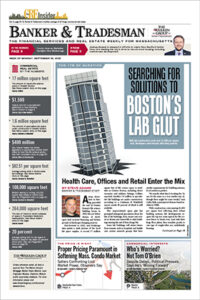Trade publications like Banker & Tradesman have taken on new importance in recent years, as traditional news publications have suffered the ravages of both the economy and the electronic onslaught.
At the local, regional and national level, every variety of professional is confronted with some trade-focused reading material – ranging from the ubiquitous “membership newsletters,” to trade association periodicals and sophisticated independent publications with extraordinary columnists (much like Banker & Tradesman).
The quality ranges from superficial boosterism to narrowly focused membership imperatives to levels of knowledgeable, objective, analytical, in-depth news coverage that is often no longer available from the local metro newspapers.
Of course, not only business interests are involved in the specialty publication game. Religions do it, as do civic groups and government and charities. All offer up examples of “news” aimed at particular audiences, often teetering on the edge of what might be considered marketing.
A usually effective way to evaluate the instincts of the publication for truth, justice, the American Way, or home-grown cheerleading is to investigate the publisher – the human being or organization that buys the ink and paper and holds some sort of veto power over the content.
Every trade publication, no matter its instincts, must decide on an appropriate balance among the theoretical purity of “objectivity” – slashing commentary that dumps on the very readers and organizations it purports to write about – and comforting prose suggesting all is well.
Relative Independence
A recent example of the tension inherent in such an environment was the squabble involving “The Pilot,” the venerable Catholic paper published by the Boston archdiocese. A cranky anti-gay column written by the editor caused some stirring among the faithful. Some, in the process of calling for the editor’s resignation, again raised the long-standing suspicion that The Pilot is not independent in the fashion of a true general-interest newspaper – or at least a paper with no official ties to the archdiocese or the church.
The issue is not unique to Boston or to the Catholic Church; many religious publications in many locales have bickered over how independent they should be. The more hierarchical faiths, including Catholics, tend to squabble the most.
Religious journalism, one of the earliest brands of “trade publication,” has a long history in Boston and the Northeast. “The Christian History” published in Boston for a few years in the 1740s. “Liberal” troublemakers of the Episcopal Church launched “The Churchman” in 1804 in New York. Catholics founded “The Shamrock” in New York in 1810.
Through generations, the Catholic press in particular faced doubts about its objectivity, in a traditional journalism-class kind of way. As the church-state historian Leo Pfeffer put it in a 1964 book, “In general, Roman Catholic religious journalism in this country has concerned itself mainly with advancing the interests of the church and defending it against misunderstanding and abuse.”
Pfeffer also wrote, in a 1959 book: “One who reads the Catholic press cannot fail to observe the almost monolithic uniformity of views on public issues.”
In fact, as even Pfeffer conceded, there was “Commonweal” and the “Catholic Worker” for more “liberal” Catholic views. Today there are, and have been, many sources of “independent” Catholic news, from the lefty/middle-of-the-road National Catholic Reporter to National Catholic News Service to the cranky, conservative “The Wanderer.”
Even among the religious publications closely tied to denominational bigwigs, there have usually been some disagreements. When Joe McCarthy was at his most controversial, the Catholic papers in Boston and Brockton, for instance, were on opposite sides of the debate. (The Pilot wasn’t too fond of him).
Banker & Tradesman isn’t a religious paper (except for wishing the God of Mammon well), but a brief pause to ponder The Pilot is a healthy reminder that we all benefit from a focus on niche publishing of various kinds. We must also remember it’s important to evaluate not only the information, but the motives of the folks providing it.
A philosophical idiosyncrasy about the news of the day is neither good nor bad – as long as you know it before you read.






